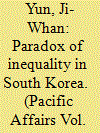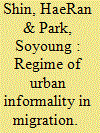|
|
|
Sort Order |
|
|
|
Items / Page
|
|
|
|
|
|
|
| Srl | Item |
| 1 |
ID:
154851


|
|
|
|
|
| Summary/Abstract |
Since the 3/11 compounded disasters, Japanese energy policy, especially its nuclear policy, has been paralyzed. After the Fukushima disasters, public opinion turned against nuclear energy while the central government continued to push for restarts of the many offline reactors. Based on nearly thirty interviews with relevant actors and primary and secondary materials, we use qualitative comparative analysis (QCA) and five case studies to illuminate the impact of conditions influencing reactor restarts in Japan after 3/11. We investigate which local actors hold the greatest power to veto nuclear power policy, and why and when they choose to use it. Key decisions in nuclear power policy involve approval from multiple institutions with varying legal jurisdiction, making vetoes the result of multiple actors and conditions. Certain legal and political factors, such as court, regulator, and gubernatorial opposition (or support), matter more than technical factors (such as the age of the reactor or its size) and other political factors (such as town council or prefectural assembly opposition or support). Local politics can stymie a national government’s nuclear policy goals through combinations of specific physical conditions and vetoes from relevant actors, rather than through the actions of local opposition or single “heroic” governors. Our findings challenge the assumption that utilities unilaterally accept a governor’s vetoes, but reinforce the notion that specific judicial and electoral veto players are blocking an otherwise expected return to a pro-nuclear status quo.
|
|
|
|
|
|
|
|
|
|
|
|
|
|
|
|
| 2 |
ID:
154854


|
|
|
|
|
| Summary/Abstract |
Since the 1987 democratic reform, regional attitudes toward the two southern provinces have been regarded as the most significant determinant of South Korean voters’ political preferences. In recent years, however, many scholars have speculated that regional animus is losing its ground as a basis for political judgment and will eventually be replaced by other politically relevant factors such as political ideology and issue preference. Others raise questions about the validity of this kind of “revisionist” argument, noting that election outcomes remain regionally divided. Adopting the implicit association test (IAT) as a measure of regional attitudes, we provide an empirical test to measure the effects of the emergence of new generations and geographical mobility in South Korean voters’ regional attitudes. Our results show that younger Korean voters are less regionally biased toward either of the two southern provinces. The only exception was the younger generation in the Honam region: they held even higher levels of animus toward Yeongnam than their older counterparts. Geographical mobility also seems to decrease regional bias. Those who have relocated to other provinces showed less regional bias when compared with the natives of Yeongnam and Honam still residing in their respective regions. Likewise, our results show that the inter-generational transfer of regional animus is not overwhelming. For the descendants of Yeongnam or Honam natives residing in another province, their family’s region of origin mattered little. In short, our findings suggest that changing generational composition and geographical mobility are likely to lessen the severity of regional animus and the political significance of regional attitudes will wane.
|
|
|
|
|
|
|
|
|
|
|
|
|
|
|
|
| 3 |
ID:
154853


|
|
|
|
|
| Summary/Abstract |
Scholars have debated whether former South Korean President Park Geun-hye’s commitment to minsaeng kyŏngje (the economy for the people’s livelihood) was a reflection of the global rise in compassionate conservatism that attempted to address growing inequality or merely lip service to social policy. However, this debate has confined the issue to the social policy realm without explaining the paradox of inequality resulting from Park’s minsaeng drive. Although this drive allowed Park to exploit inequality for political gains, old policies of developmentalism increasingly returned to the forefront of her policy agenda. This article offers an alternative argument: that minsaeng kyŏngje was neither a sincere nor a false compassion, but a political discourse maneuvered by the Korean conservatives to reinvigorate old developmentalism in the face of inequality. The Park government first offered minsaeng kyŏngje as a catch-all discourse, which included the promotion of welfare policies and the traditional doctrine of economic development. Later, the government reinterpreted minsaeng as a subset goal of economic development. It scaled back welfare pledges and manipulated the minsaeng concept to legitimize development policies. By analyzing both the orientational and organizational characteristics of Korea’s developmental welfare state via manifesto analysis and word cloud testing, this article demonstrates how Korean conservatives made use of the norm of low taxation to avoid a systematic welfare increase and proposed an alternative minsaeng discourse by combining old developmentalism with a few welfare policies. The structure of a narrow power coalition enabled the Park government to maneuver the minsaeng discourse to fulfill its shifting policy priorities without coordination with other political actors.
|
|
|
|
|
|
|
|
|
|
|
|
|
|
|
|
| 4 |
ID:
154852


|
|
|
|
|
| Summary/Abstract |
This study looks at how a regime of urban informality has taken shape in a migrant receiving community in Seoul, South Korea. It investigates how actors from the public sector and the private sector came to help undocumented Chosŏnjok migrants stay in the Kuro/Taerim area of Seoul regardless of their legal status. We view such practices as a response to local changes provoked by shifts in the geopolitical environment and fluctuating national policies. Based on longitudinal fieldwork, including in-depth interviews, participant observation, and archival research the findings of this study are as follows. First, public-sector actors, including the Korea immigration service, local authorities, and local police, have shifted their roles from controlling to accommodating, being motivated by competition with other departments, promotion, and personal attachment. Second, the private sector has expanded its role, building on relations with Chosŏnjok as easygoing customers and service providers. This study contributes to the understanding of regimes of informal settlements and their spatial contexts.
|
|
|
|
|
|
|
|
|
|
|
|
|
|
|
|
|
|
|
|
|